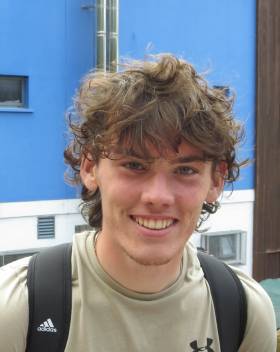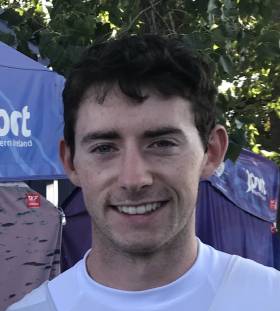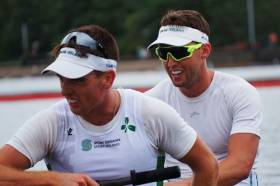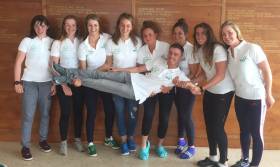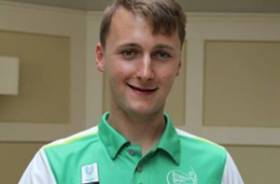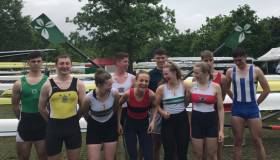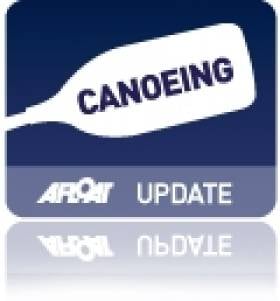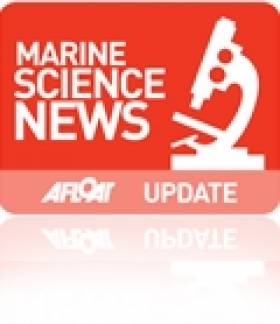Displaying items by tag: European
Ronan Byrne In A Final at European Under-23 Championships
#Rowing: Ronan Byrne won his repechage and will compete in the A Final of the men’s single sculls at the European Under-23 Championships in Ioannina in Greece on Sunday. Lightweight single sculler Hugh Moore will compete in the B Final and the double of Ross Corrigan and Alex Byrne the C Final. Both crews placed fourth in their repechages.
European Under-23 Championships, Ioannina, Greece, Day One (Irish interest)
Men
Double Sculls – Heat One (First Three to A/B Semi-Finals; rest to Repechage): 4 Ireland (A Byrne, R Corrigan) 6:46.07. Repechage (First Three to A/B Semi-Finals; rest to C Final): 4 Byrne, Corrigan 6:50.42.
Single Sculls – Heat One (First to Final; rest to Repechage): 2 R Byrne 7:06.43. Repechage (First Two to A Final; rest to B Final: 1 Byrne 7:11.85
Lightweight Single – Heat One (First to Final; rest to Repechage): 5 H Moore 7:38.67. Repechage (First Two to A Final; rest to B Final): 4 Moore 7:21.09.
Women
Four, coxed – Exhibition/Race for Lanes: 3 Ireland 7:24.60
Ireland Crews Set For Repechages at European Under-23 Championships
#Rowing: Ireland’s first outings at the European Under-23 Championships in Ioannina, Greece, sent three of the four crews to repechages. Ronan Byrne, who took silver in the double sculls at the senior World Championships, needed to win his heat of the single, but finished second behind Stefanos Ntouskos of Greece. The men’s double and lightweight single will also have to compete in repechages to progress.
The women’s coxed four finished third in their five-boat race for lanes.
European Under-23 Championships, Ioannina, Greece, Day One (Irish interest)
Men
Double Sculls – Heat One (First Three to A/B Semi-Finals; rest to Repechage): 4 Ireland (A Byrne, R Corrigan) 6:46.07.
Single Sculls – Heat One (First to Final; rest to Repechage): 2 R Byrne 7:06.43.
Lightweight Single – Heat One (First to Final; rest to Repechage): 5 H Moore 7:38.67.
Women
Four, coxed – Exhibition/Race for Lanes: 3 Ireland 7:24.60
#Rowing: Shane O’Driscoll and Mark O’Donovan took fifth in their B Final of the pairs, 11th overall, at the European Championships in Strathclyde Park in Scotland. In overcast but calm conditions, Ireland started well, but Germany took over and held the lead to 1500 metres. By then they were already under real pressure from Ollie Cook and Matt Rossiter from Britain, who took over and won. O’Driscoll won a battle with Ukraine at the back of the field but while they had the fastest final 500 metres they could not get past the Netherlands or Russia, who finished fourth and third. Germany were second.
European Championships, Day Three, Strathclyde, Scotland (Irish interest)
Men
Pair – B Final (Places 7 to 12): Britain 6:36.77; 5 Ireland (M O’Donovan, S O’Driscoll) 6:44.58.
Ireland Women's Eight Slots Into Fifth in European Under-23 Final
#Rowing: Ireland finished fifth in the A Final of the women’s eight at the European Under-23 Rowing Championships today. The crew, stroked by Emily Hegarty were well behind the top four, which fought it out for medals, but beat Germany, as they had in the race for lanes on Saturday. Russia took gold, Romania silver and Britain won a battle for bronze by .36 of a second from Belarus.
European Under-23 Championships, Kruszwica, Poland, Day Two (Irish interest)
Men
Lightweight Single Sculls – A/B Semi-Final Two (First Three to A Final; rest to B Final): 1 Czech Republic 7:34.58, 2 Ireland (A Goff) 7:37.64, 3 Sweden 7:42.26.
Semi One: 1 Austria 7:32.69, 2 Turkey 7:34.45, 3 Slovenia 7:40.16
A Final: 1 Czech Republic 7:44.38, 2 Austria 7:46.64, 3 Slovenia 7:48.58; 5 Ireland (A Goff) 7:58.72.
Women
Eight – A Final: 1 Russia 6:45.58, 2 Romania 6:46.44, 3 Britain 6:49.16; 5 Ireland (R Gilligan, N Landers, C Feerick, C Dempsey, A Corcoran, O Forde, S O’Connor, E Hegarty; cox C O’Connell) 7:11.26
Goff Misses Out on a Medal at European Under-23 Champs
#Rowing: Ireland’s Andrew Goff finished fifth at the European Under-23 Rowing Championships in Poland today. Jan Cincibuch of the Czech Republic won gold. He finished ahead of Austria, Slovenia and Turkey, who battled it out for the other medals, with Turkey’s Enes Yenipazarli missing out, though he had shown real guts to take on Cincibuch. Goff was not able to bridge the gap to this leading group.
The Ireland women’s eight are set to compete in their A Final in Kruszwica at 1.45 Irish time.
European Under-23 Championships, Kruszwica, Poland, Day Two (Irish interest)
Men
Lightweight Single Sculls – A/B Semi-Final Two (First Three to A Final; rest to B Final): 1 Czech Republic 7:34.58, 2 Ireland (A Goff) 7:37.64, 3 Sweden 7:42.26.
Semi One: 1 Austria 7:32.69, 2 Turkey 7:34.45, 3 Slovenia 7:40.16. A Final: 1 Czech Republic 7:44.38, 2 Austria 7:46.64, 3 Slovenia 7:48.58; 5 Ireland (A Goff) 7:58.72.
Jegou Bows Out in European Semi-Finals
#Canoeing: Liam Jegou finished 17th in the under-23 C1 semi-final at the European Junior and Under-23 Championships in Hohenlimburg, Germany today.
The France-based competitor incurred a two-point penalty on the first gate, and while he did not touch or miss another gate his time put him three seconds outside the top 10, who qualified for the final.
Silver Dream For Ireland at World Junior Championships
#Rowing: Ireland’s Aoife Casey and Margaret Cremen took a silver medal at the European Junior Rowing Championships today in Germany. The Skibbereen/Lee crew took second behind dominant crew Germany, and ahead of Italy, who took bronze. In a strong field, Denmark, the Czech Repbublic and Britain took the next three places. Ireland had the best last 500 metres, pushing up on Germany, but Italy came strong at the end to give the girls in green a small scare.
Casey, a daughter of Ireland coach Dominic, represented Ireland as a junior at the World Championships last year, while Cremen took a bronze medal at the Coupe de la Jeunesse in 2016.
Ireland’s three other crews placed in the top 10 to make it a very satisfactory campaign in Krefeld.
European Junior Championships, Krefeld, Germany (Selected Results; Irish interest, Day Two)
Men
Pair – Semi-Final B: 6 Ireland (A Johnston, R Corrigan) 7:17.95. B Final: 4 Johnston, Corrigan 7:20.57.
Sculling, Quadruple – Semi-Final B: 5 Ireland (J Quinlan, J Keating, M Dundon, B O’Flynn) 6:20.31. B Final: 4 Ireland 6:24.6
Women
Pair – Semi-Final A: 4 Ireland (G McGill, E O’Reilly) 7:51.31. B Final: 3 Ireland.
Sculling, Double – Semi-Final B: 2 Ireland (A Casey, M Cremen) 7:26.83. A Final: 1 Germany 7:21.64, 2 Ireland 7:25.84, 3 Italy 7:28.32; 4 Denmark 7:31.32, 5 Czech Republic 7:40.58, 6 Britain 7:44.31.
#Rowing: Ireland’s Margaret Cremen and Aoife Casey finished second in their semi-final and will compete in the A Final of the double sculls at the European Junior Rowing Championships in Krefeld in Germany. The Skibbereen/Lee combination were just .31 of a second off winners Denmark in their race and had the second-fastest time overall as they head into the A Final.
Three other crews – the men’s pair and quadruple and the women’s pair – finished outside the A Final places.
European Junior Championships, Krefeld, Germany (Selected Results; Irish interest)
Men
Pair – Semi-Final B: 6 Ireland (A Johnston, R Corrigan) 7:17.95.
Sculling, Quadruple – Semi-Final B: 5 Ireland (J Quinlan, J Keating, M Dundon, B O’Flynn) 6:20.31.
Women
Pair – Semi-Final A: 4 Ireland (G McGill, E O’Reilly) 7:51.31.
Sculling, Double – Semi-Final B: 2 Ireland (A Casey, M Cremen) 7:26.83.
#CANOEING: Jenny Egan brought Ireland a first senior medal at the European Canoe Sprint Championships when she took bronze in the Women’s K1 5,000 metres in Racice in the Czech Republic today. Egan, from the Salmon Leap club in Leixlip, was part of a successful breakaway at 1,000 metres with Maryna Litvinchuk of Belarus, who took gold, and Irene Burgo of Italy, the silver medallist. Less than two-thirds of a second divided the three.
Ireland paracanoeist Patrick O’Leary finished fourth in his KL3 200 metre final. Robert Oliver of Britain took gold. O’Leary was just a third off a second of taking bronze.
European Canoe Sprint Championships, Racice, Czech Republic (Selected Results; Irish interest)
Saturday
Men
K2 200 – Heat Three (First Three to A Final; 4-7 to B Final; rest out): 1 Serbia 31.676; 8 P Egan, S Dobrovolskis 34.808.
C1 200 - Heat Three (Winner to Final; second to seventh to semi-final): 1 Portugal (H Silva) 39.236; 7 A Jezierski 43.220. Semi-Final: Jezierski did not start.
K1 200 – Heat Two: 6 T Brennan 37.596. Semi-Final (First Three to A Final, 4-7 to B Final): 1 Latvia (A Rumjancevs) 36.072; 7 T Brennan 37.852
Paracanoe KL3 – A Final: 1 Britain (R Oliver) 40.88; 4 P O’Leary 42.536.
Women
K1 200 – Heat Three (Winner to Final; second to seventh to semi-final): 1 Serbia (N Moldovan) 40.236; 7 J Egan 43.384. Semi-Final (First Three to A Final, 4-7 to B Final): 1 Russia (N Podolskaya) 42.196; 7 Egan 45.344.
Sunday
Men
K1 200 – B Final: 5 T Brennan (14th overall)
K1 5,000 – A Final: 18 P Egan 22:58.09.
Women
K1 5,000 – A Final: 1 Belarus (M Litvinchuk) 22 mins 19.25 seconds, 2 Italy (I Burgo) 22:19.68, 3 Ireland (J Egan) 22 mins 19.9 seconds.
K1 500 – B Final 6 J Egan 2:00.376. (15th overall)
K1 200 – B Final: 7 J Egan 44.896 (16th overall)
New Marine Atlas Answers Important Questions
This second edition of the Atlas of the North Western Waters is now available for free download here. It has been funded under the EU MEFEPO (Making the European Fisheries Ecosystem Plan Operational) project, made up of ecologists, economists, management experts and fisheries scientists who are trying to make ecosystem-based fisheries management (EBFM) a reality in Europe. EBFM seeks to support the 'three pillars of sustainability' (ecological, social and economic) and as such includes human activity in the ecosystem.
The Atlas is intended for policy makers, managers and interested stakeholders. Its purpose is to provide a broad overview of the ecosystem of the NWW Regional Advisory Council (RAC) area with the science kept as clear and concise as possible and technical language kept to a minimum.
"Next year the European Marine Strategy Framework Directive requires an analysis of the features, pressures and impacts on member states' waters and the reform of the Common Fisheries Policy will put more emphasis on regionalising management," said Dr. Cormac Nolan of the MEFEPO project at the Marine Institute, "so this new edition of the North Western Waters Atlas, and the work of the MEFEPO team behind it, is both timely and valuable."
The first edition of the Atlas, published in 2009, was extremely well received and this 2nd edition has been updated and revised in response to stakeholder feedback. The Atlas provides up-to-date information on the physical and chemical features, habitat types, biological features, birds, mammals, fishing activity and other human activities taking place within the NWW region. There are new chapters on elasmobranchs and mariculture and the hot topic of discarding is covered in more detail. Background material on four NWW fisheries (mackerel, hake, Nephrops and scallop), which have been used as case studies in the MEFEPO project, is also presented.


























